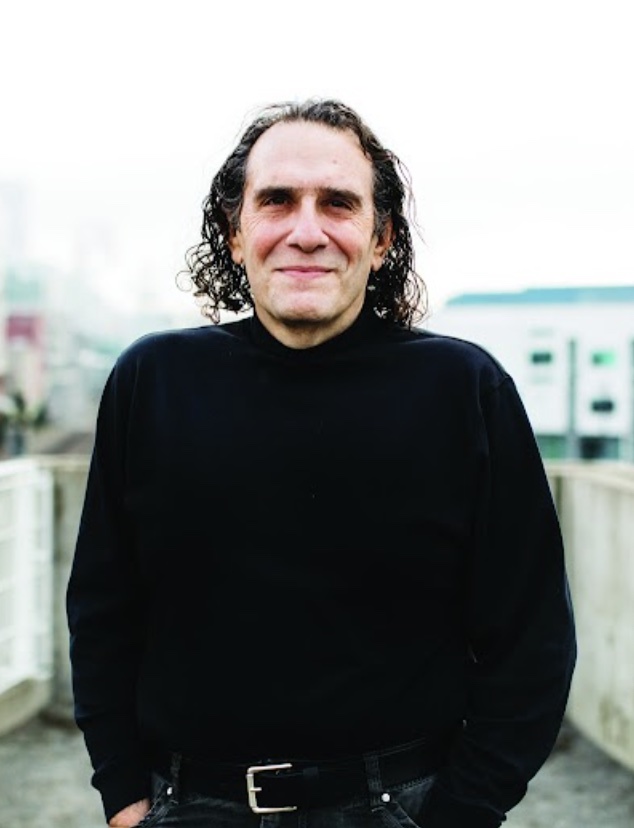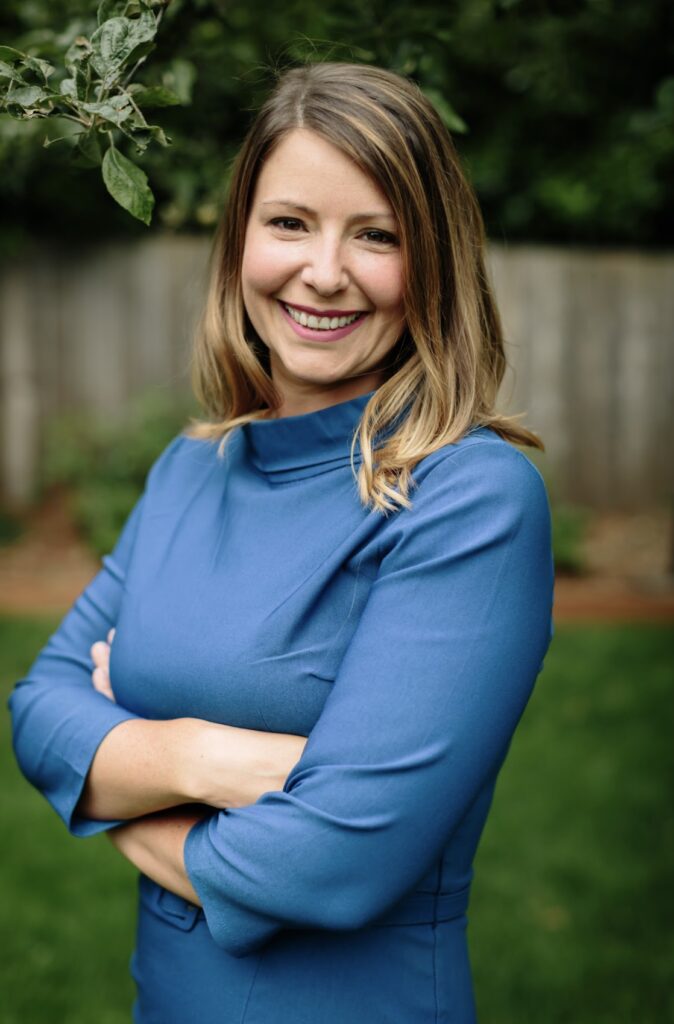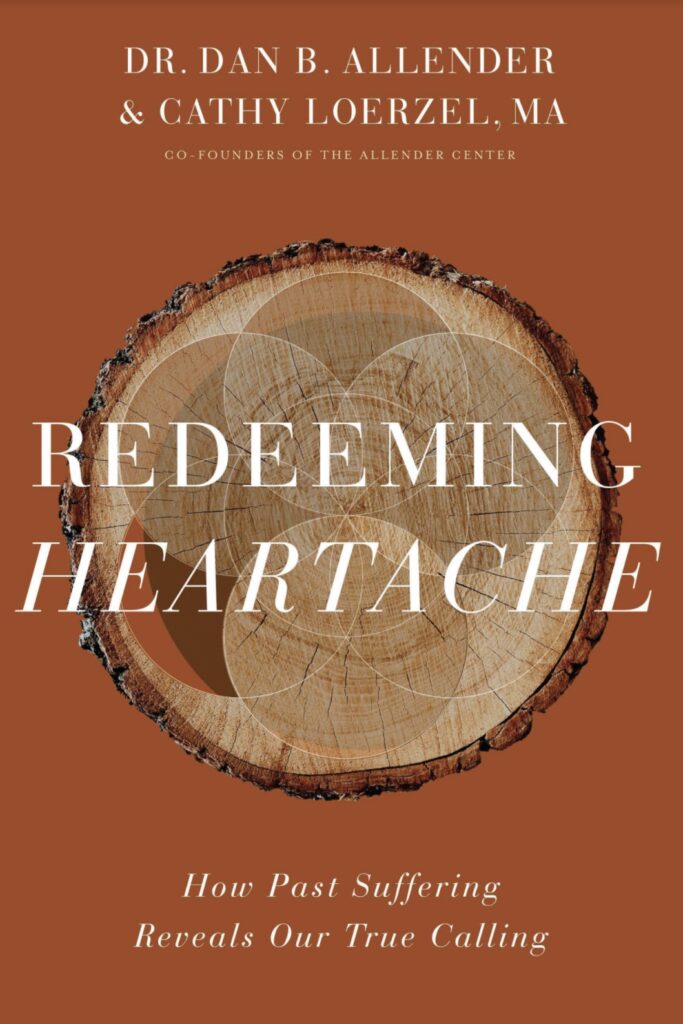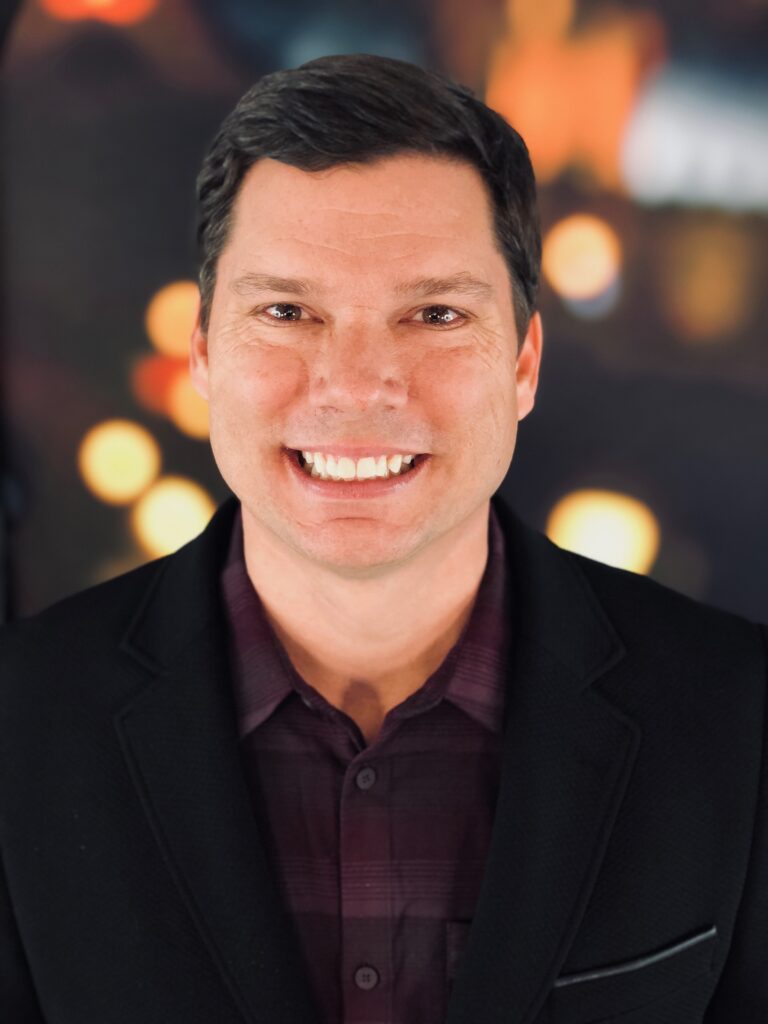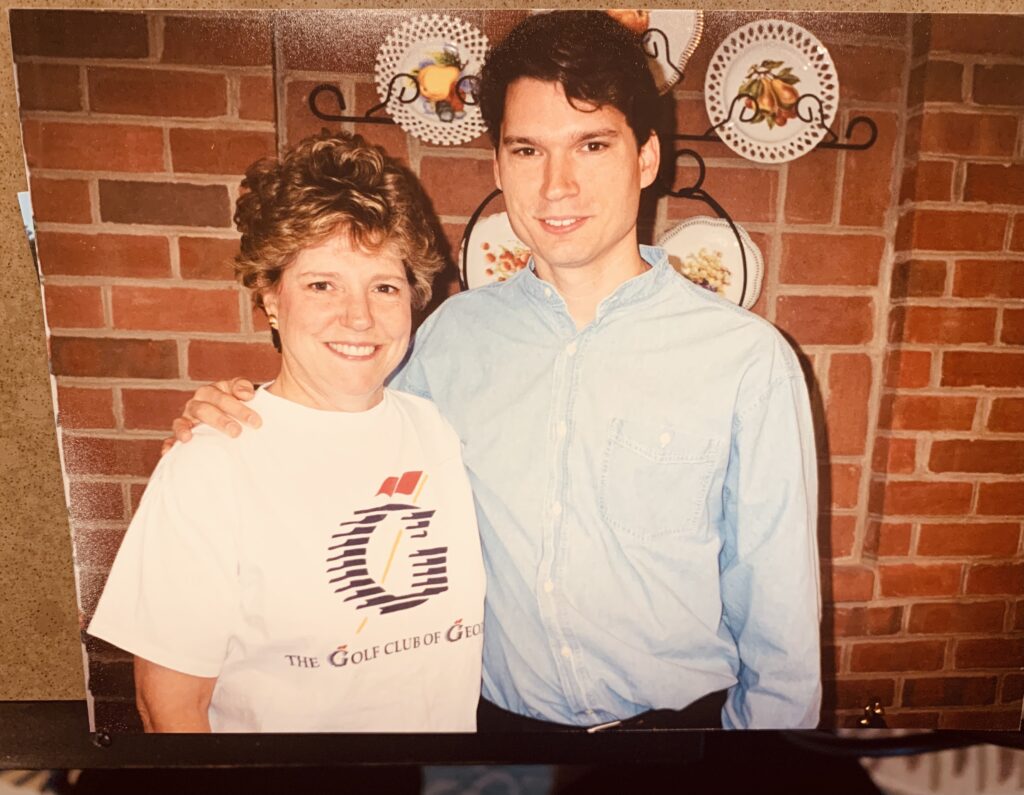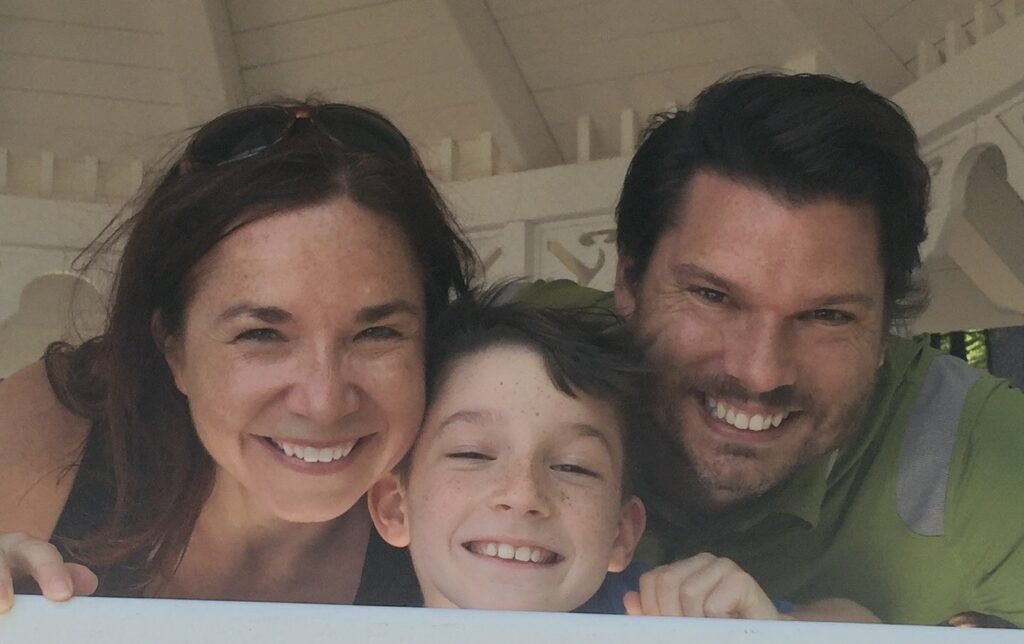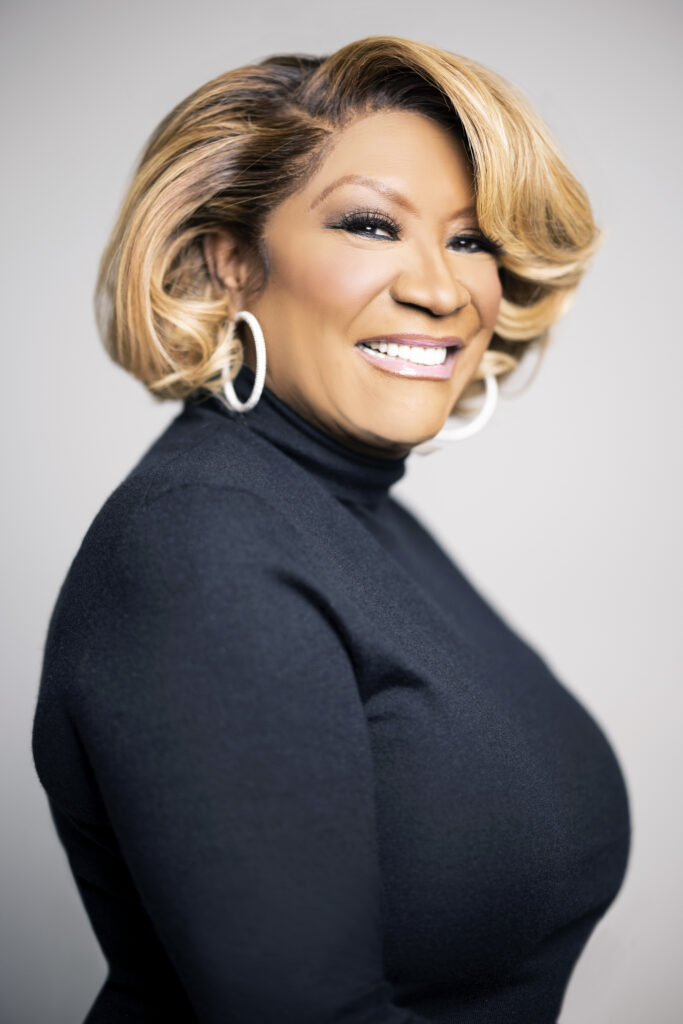Jesus Is Fiercely Pursuing Our Hearts: Dan Allender and Cathy Loerzel & Andrew Farley
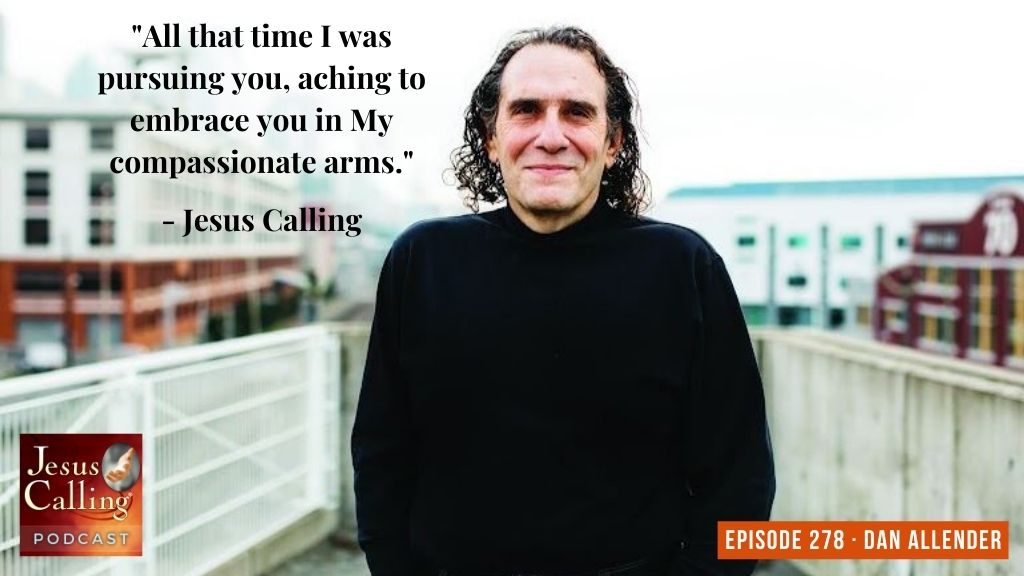
Dan Allender: That tension between a desire that has been implanted by the living God and yet an impulse on our own part to try and create redemption on our own has opened not only my eyes to the reality of my own struggles, but has helped me gain just a deeper understanding of the kindness and the patience but the fierce pursuit of Jesus in each of our lives.
Jesus Is Fiercely Pursuing Our Hearts: Dan Allender and Cathy Loerzel & Andrew Farley – Episode #278
Narrator: Welcome to the Jesus Calling Podcast. Each one of us has a unique story to share—and within each of these complex stories, many of us have experienced loss, heartache, shame, and tragedy which profoundly affect our lives. But once we begin to face our heartaches and realize their effect on our lives, we can see the slow steady pursuit of a God who only desires our healing and wholeness. This week we’ll be discussing the way that God cares about each of our stories and is there to walk us through our trauma with Dr. Dan Allender and Cathy Loerzel—founders of The Allender Center, and how we can act out of the new heart He so lovingly restores to us with Pastor Andrew Farley.
First, let’s hear from Dr. Allender and Cathy Loerzel.
Dan: I’m Dan Allender, and I have been a psychologist for the last feels like about 200 years, but that’s because in part I have the privilege of working with people who have experienced significant trauma and heartache, and the privilege of being able to work with people who really have suffered. The dark side of living in a fallen world opens our eyes—at least it’s opened my eyes—to the reality that we are truly crying out for redemption. And yet so often we are deeply committed to trying to find it on our own.
Cathy: I’m Cathy Loerzel, and I am the co-founder of The Allender Center with Dan and Becky Allender. We started The Allender Center a little over a decade ago. And my background is in organizational development and business process reengineering if you can believe it. But I got my master’s in psychology from the Seattle School of Theology and Psychology and graduated in 2007. And quickly after that, I started to work with Dan and started The Allender Center. And since then, we’ve built the center and designed a new therapy model called trauma-informed narrative therapy.
Everyone’s Story Has Deep Meaning
Dan: Anyone who thinks they have a boring story does not understand the deep, redemptive commitment of Christ to find us. And for me, I grew up in a family that I’ll just say had its own deep levels of craziness. And in that intersection of broken and beautiful, it opened my heart to the reality of the importance of story where we’ve come from, the importance of engaging our story, because I was surrounded by very confusing, inarticulate, unaddressed stories.
“Anyone who thinks they have a boring story does not understand the deep, redemptive commitment of Christ to find us.” – Dr. Dan Allender
I have a story of past sexual abuse. So there was a lot of harm, but no opportunity to name it or address it. And in that context, my role was to keep my family as stable as I could possibly keep it. And there was just no place for God.
I don’t remember ever even having a conversation about God. We never went to church. There was nothing of spirituality until I met my best friend when I was thirteen. And in this conversation with him, probably when we were fourteen, he was talking about the Bible. And I went, “The what?”
He goes, “The Bible.”
And I’m like, “I don’t know what you’re talking about.”
And he said, “You don’t know about the New Testament?”
And I’m like, “Testament? What are you talking about?”
So it was a revelation to me that God had been involved in writing a book. And I’m like, “God wrote a book, who published it?” So the open door to this conversation went on for years. And thankfully, my best friend had a family that gave me my first sense of what a mom and a dad and sisters and a brother might look like. And in some ways, I was adopted into their Christian world.
So that was my entry into the life of Christ. But because of my abuse, because of my own sin, I was on a path utilizing alcohol by the time I was probably ten or eleven, using drugs like marijuana and other drugs. By the time I’m thirteen/fourteen, I’m involved in selling alcohol and drugs. So my life is on a trajectory of, well, death. And yet because of this engagement with a family that speaks about Jesus, that lives Jesus, that intrigues me. But also like I don’t believe that stuff. Nonetheless, in the larger context of a deal that had a really bad prospect of being killed, you know, a lot of us come to Christ when things are really bad. And that was my moment of coming into a relationship where it was like, “Fine, I’m about to die. Fine.” And it wasn’t a lot of conviction. That wasn’t a deep sense of, I’m a sinner, deserving, et cetera, et cetera. It was just more like, I am in trouble. And if this is true, then I’ll give it a shot. So my Christian life has been at times a bit more like Jacob stumbling forward, limping, but nonetheless aware that to whom else shall I go? Who else has the words of life but Him?
Cathy: When I grew up, my dad was in the military, and so we moved around a lot. And there’s something very distinctive about the military culture that really asks you to pull yourself up by your bootstraps.
As a military family, you say goodbye all the time. You’re meant to be able to handle significant shifts in your life. New schools, new houses, new friends, new churches. And I found myself navigating a lot of change very quickly in my world. But my parents were both born of severe trauma and their stories in their family of origin, which I will not to get into—those are their stories, not necessarily mine—but it impacted me because they also held really strongly to the idea that you don’t go back, you move forward, you figure out how to survive. And they were so committed to not redoing the harm that happened to them in their childhood. But in that, we never actually talked or felt what was true in our own world. It was always a sense of, “Move on.” You know, “Don’t be sad about new friends. You are going to find new ones and it’s going to be better there.” And there were always incentives built in to not grieve, to not feel. And I clipped into that really quickly.
My role as a child was really to mitigate a lot of that chaos, a lot of what was going on underneath that was never talked about. So my parents never talked about their own childhood traumas. My dad’s father committed suicide when he was sixteen, and I didn’t even know about that until I was a lot older.
I struggled with a lot of anxiety, eating disorders. I had sexual abuse when I was a child that my parents didn’t know about that impacted my world. But again, none of that was ever spoken to. And my parents were incredibly committed to caring for us and creating a good world. So it was very confusing. And that confusion lived inside my body. It wasn’t until I started to get older, have different experiences, and really read some books when I was in college where I started to realize what had actually happened and what was going on. I started to work with other college kids and high school kids and youth groups, inviting them to more of the truth of their stories and what was actually going on underneath the surface.
I had a friend come and say, “Look, I think you have a calling in this.” There’s more going on than what people are saying, especially in the church, because we’re so committed to believing that if we have the spirit in our souls, then we’re healed and never have to go back and actually deal with what was true about who we were in our backgrounds. And so then I found Dan and the school and it just really resonated with me because it gave me language for what I knew to be true in my heart and in my body, but had never been allowed to be spoken of. And I think what I loved about the work is that it also gave dignity to my family as well because it asks you to tell the truth. And the truth was actually more honoring than keeping things hidden, but it didn’t ask you to villainize or demonize people that asked you to tell the truth and release all of us from the shadows that had been holding us away from God and away from each other.
“There’s more going on than what people are saying, especially in the church, because we’re so committed to, you know, believing that if we have the spirit in our souls, then we’re healed and never having to go back and actually deal with what was true about who we were in our backgrounds.” – Cathy Loerzel
Jesus Accepts Us Again and Again
Dan: The Gospel has always been something in the encounter that has told the truth but invited me into something more than I could ever fully comprehend, and that is forgiveness, pursuit, the notion that you are the light of God, and in that, the juxtaposition of—and hearing Cathy’s story again, like, rules have never been something I’ve had to obey. But I’ve understood in many ways that as a rule-breaker, that there is something of the containment, the comfort of a direction to follow that I can never follow well and will always stumble in. But I am received again and again and infinitely, again and again as a beloved son, not an orphan, not a stranger, not a widow, not in many ways the effect of what my trauma has brought me to be. And yet, if you can hear what seems to be contradictory, there is a telling of the truth, but also a greater truth and the reality of the Psalms that sing of lament and complaint, yet of praise and thanksgiving—we can hold the reality of our brokenness and our renewed beauty as image-bearers and as re-created in the image of Christ.
“We can hold the reality of our brokenness and our renewed beauty as image bearers and as re-created in the image of Christ.” – Dr. Dan Allender
And that is where, you know, kind of the mystery of how each of our brokenness moves us through being an orphan, a stranger, and a widow into something that actually our trauma becomes the ground for us to be able to become something of who we’re meant to be for the larger story of God.
Cathy: I really believe that a lot of our work is helping people navigate how they’ve protected themselves from grief and suffering and heartache, but really how that has set us up for very dysfunctional patterns that keep us from actually being able to experience the beauty, the goodness that is present on the Earth. But we don’t have access to it. If we’re more committed to a false representation of the world, you know, which is either it’s all broken where we’re leaning into cynicism or, you know, God redeems it all. And it’s all fine if you just follow the rules. Right? Both are not true.
“A lot of our work is helping people navigate how they’ve protected themselves from grief and suffering and heartache, but really how that has set us up for very dysfunctional patterns that keep us from actually being able to experience the beauty, the goodness that is present on the Earth.” – Cathy Loerzel
Dan: If we can courageously enter the reality of our own brokenness and the brokenness of this world, we think we’re going to be overwhelmed. We think we’re actually going to be destroyed. But it’s where God meets us. It’s the valley of the shadow of death where the light of His goodness shows. So if we have the courage to meet Him in darkness, He is so good to offer us something of the light of His life. And in that light, we have the ability to begin to see. No, we’ve been deeply harmed. Yet we’ve been called to become like Jesus, like a prophet, like a priest, like a king or queen.
“If we can courageously enter the reality of our own brokenness and the brokenness of this world, we think we’re going to be overwhelmed . . . if we have the courage to meet God in darkness, He is so good to offer us something of the light of his life. And in that light, we have the ability to see.” – Dr. Dan Allender
If we can get a sense of how our harm actually creates a trajectory toward who was not only meant to be, but how we’re meant to offer the goodness of God in the land of the living, then we will be free not just from shame and despair, but in many ways from what evil intended for that past harm to bring us, which is fear, hatred, a sense of despair. But when we begin to see that that is the context for the life of God to shine, we’re then put in a position where our faces are lifted. We’re not brought to shame, where we actually can begin to encounter what it means to be beloved. And in that freedom, we actually have not only new power, new purpose but new joy.
Finding Comfort in the Present, in His Presence
Dan: I would love to read a passage from Jesus Calling from January 29th.
KEEP YOUR FOCUS ON ME. I have gifted you with amazing freedom, including the ability to choose the focal point of your mind. Only the crown of My creation has such remarkable capability; this is a sign of being made in My image.
Let the goal of this day be to bring every thought captive to Me. Whenever your mind wanders, lasso those thoughts and bring them into My Presence. In My radiant Light, anxious thoughts shrink and shrivel away. Judgemental thoughts are unmasked as you bask in My unconditional Love. Confused ideas are untangled while you rest in the simplicity of My Peace. I will guard you and keep you in constant Peace as you focus your mind on Me.
Cathy: The tenderness of Jesus is what has been captivating my heart lately. And I think what captivates me about even that passage is that the call and the love of God is so kind and tender and there is nothing in our hearts that are a surprise and the freedom that could come from tending to those thoughts and allowing there to be such goodness behind the call of Jesus has been profound to me. And in the midst of being courageous enough to look at sorrow and grief and suffering, I think it’s the kindness of God that will lead all of our hearts to repentance.
Dan: That passage for me reminds me that though we have to do the work of engaging our story and all its complexity and all its entanglements, we still have to come back to the presence of the deep and simple love of Jesus in order to have the courage to do the work of stepping into the past, of looking into the future, but finding our comfort in the present, in His presence.
Narrator: To learn more about the work that Dan and Cathy do at The Allender Center, or to get their new book, Redeeming Heartache: How Past Suffering Reveals Our True Calling, please visit TheAllenderCenter.org.
Stay tuned to Andrew Farley’s story after a brief message.
New! Jesus Listens, available now
When your days feel overwhelming, and your life has you anxious and stressed, you can find peace and hope in Jesus. There’s a brand-new 365-day devotional prayer book called Jesus Listens from Sarah Young, the author of Jesus Calling. With Jesus Listens, you can strengthen or renew your relationship with God through the continual conversation of prayer. Jesus Listens is perfect if you’re busy with life’s demands but want to grow in your prayer life. Looking for rest and hope from difficult times? Or, are not even sure how to pray? By praying scripture through this daily devotional prayer book, you’ll experience how intentional prayer connects you to God, changes your heart, and can even move mountains. For more information on how to get the new 365-day devotional prayer book, Jesus Listens, visit www.jesuscalling.com/jesuslistens.
Narrator: Our next guest is pastor Andrew Farley, who grew up in the church quite literally, as his parents created a church within their home. However, when Andrew was nineteen, he faced a crisis of faith that many Christians will go through—trying to get past a stalemate point in his faith and continue growing and feeling that connection with God. Now, as a radio host and leader, Andrew is helping others to uncover what it means to be a good Christian.
Andrew Farley: My name is Andrew Farley, and first and foremost, I’m a child of God, I’m born of Him. I love what I do. I’m currently serving as a pastor and an author. I write Christian books.
I grew up on a horse farm in Warrenton, Virginia. We had a dozen horses. We had 100 cows, pigs, chickens, I mean, the whole nine yards. And it was definitely a fun way to grow up. When I was twelve, I wanted to follow in my dad’s footsteps, or at least I thought, and be an attorney. I also flirted with the idea of wanting to be an actor in Hollywood. So all of that is kind of funny. Looking back, I just had no idea where I would end up. But I absolutely love what I’m doing today, communicating the love and grace of God. And I wouldn’t trade it for anything else.
I literally grew up in church because my parents started a church in our house when I was about three years old. So for me, going to church was going down to the living room and enjoying a Sunday. And then from there it grew and they got a building, and it’s still going today in Virginia. So I grew up in a home of believers and I became a believer at a young age.
Finding a New Identity in Christ
But by nineteen years old, I found myself on the floor of my apartment and I was just burned out begging God for answers. I was saying, “God, I’m doing everything they said to do. I’m sharing my faith with everybody that I meet, whether they want to hear it or not. I’m in church every time the doors are open. I’m reading my Bible four to five hours a day and I still don’t feel closer to You. I don’t feel like I’m growing spiritually. So what’s going wrong here?”
You know, I think my formula was broken. I had put my antenna up to the Christian world and was trying to figure out what to do, you know, read my Bible, have my quiet time, go to church, share my faith. I was doing all of it, but something was definitely missing. And I found out later that what was missing was a true understanding of God’s grace. I mean, I didn’t really know much about God’s love and God’s grace and God’s forgiveness and my identity in Christ. So it was really the decade that followed that God used to strengthen my understanding and show me how to find stability and fulfillment and motivation.
I think what brought it together for me was something called the new covenant and the new covenant is talked about all over the New Testament. But for me, honestly, I’d been in church for two decades and I had never heard a single sermon on what is the new covenant? Why is it so much better than the old covenant? Why when did it come in? Why is it such a big deal? So I started looking at the Book of Hebrews and God really used that to minister to me. The Book of Hebrews is one of the least studied books in the Bible today. And I just find that it’s incredibly powerful.
So if you look at the middle of Hebrews, chapters six to ten, basically you’re seeing that Jesus is the author of a new covenant. It’s better than the old, it’s founded on better promises. And I just sort of mashed the Old Testament together with the New and didn’t really understand the difference. And so for me, it was understanding that Pentecost was a really big deal that they had never experienced before and that me, as a born again believer, that I was experiencing something that Abraham and David and Sampson and Esther and all the people from the Old Testament never quite fully had. I mean, even Hebrews 11 says that we have something better than they had and that they aren’t made perfect apart from us. And so they were waiting and waiting and waiting in anticipation. And we’ve got the best thing going. And I guess I just didn’t really know that.
So part of the reason that I love to write about our identity in Christ is because that’s what brought it together for me, knowing that when I read an instruction in the New Testament, let’s say I put off bitterness or put on love or whatever, that’s not just prescriptive telling me what to do. It’s also descriptive of my heart, telling me what my heart looks like and what I’m going to be fulfilled by God is never asking me to do something that I don’t really want to do. At the core, He’s not asking me to fake it. He’s not asking me to put on a mask. So when He says, “Put on love,” that’s because He’s poured out His love in my heart. When He says, “Put on Christ,” that’s because Christ lives in me. When He says, “Put off bitterness,” that’s because I have a new forgiving heart. So when I realized what kind of heart I have, then I can really live from it.
You’re a partaker of the Divine nature. You’ve got this newborn again heart and born again spirit. We’ve got to go to the place in our heart where Christ lives. God cleaned house and He moved in. And we’ve got this go-to place.
Understanding the True Meaning of the Bible
I would say getting a Ph.D. in linguistics definitely helped me. You’re writing a thesis and then a dissertation and you’re defending them. And so all of that gave me some really good practice at writing and defending a message, the message that I now proclaim. And so that would be the first thing. But then just studying words and studying grammar and looking at how people communicate. I did quickly become aware of a lot of verbiages that Christians use that can actually miscommunicate a message. And the audience ends up believing something that sometimes the speaker didn’t even intend.
And we’ll end up with all kinds of verbiage that are not actually in the Bible. We tell Christians that they go in and out of the will of God. Well, the Bible never actually says you’re going in and going out and going in and out of the will of God. And then secondly, we’re telling Christians that they go in and out of fellowship with God. And fellowship is not used in that way. In the New Testament, you’re either in the fellowship and saved or you’re out of fellowship and lost. But if you’re in Christ, then even when you sin, you’re going to have to sin while you’re still joined to Jesus. You’re going to have to sin while He still lives in you. He says, “I’ll never leave you. I’ll never forsake you. Nobody can snatch you out of my hand. Even when you’re faithless, I remain faithful. Nothing separates you from the love of Christ.” So that’s true even when we’re in our worst mistakes. And I just think that we have accidentally communicated a God that is in some sort of barbershop chair in Heaven and is swirling around away from us when we sin and then rotating back when we have our quiet time. And so then we’ve got an in and out and in and out of fellowship. And I think we need to know that His face is always toward us and that He never leaves us. And sure, we can quench the Spirit or grieve the Spirit. He’s deeply concerned over us, but He never separates Himself. And so that’s why I think it’s so important to communicate the grace of God really, really clearly.
“I just think that we have accidentally communicated a God that is in some sort of barber shop chair in heaven and is swirling around away from us when we sin and then rotating back when we have our quiet time. And so then we’ve got an in and out and in and out of fellowship. And I think we need to know that His face is always toward us and that He never leaves us.” – Andrew Farley
Living Your Life with a New Heart
The true measure that Christ is at work in us is the fruit of the Spirit. And what I love about that is that His fruit born in us is compatible with any part of our day, whether we’re taking the kids to school or sitting in our cubicle typing away or taking out the trash or doing the dishes, whatever it is, we need Him to be our patience and we need Him to be our wisdom and we need Him to be our counsel. And so His presence and the fruit of the Spirit being born in our lives, that’s what it’s all about. And as I said, what’s so beautiful about that is we don’t have to become somebody else. He’s compatible. He’s not just our Savior and our Lord. He’s our life. He’s our everything. You know, God gives us wisdom, and He’s our counselor and our comforter and our guide. I think we rely on Him every second. “All right, Lord, You live in me. So show me how to respond to this person.”
I’m so used to living from my gray matter. I just want to employ my brainpower and just power through this. But He’s saying, “Wait a minute, will you take the one-foot journey from head to heart? That’s where I live in you. And so it’s not just about your brain waves. It’s about living from this new heart that I gave you as you communicate with other people, as you love other people, as you do life, whatever it entails, you’ve got this go-to place at the core of your being where you can trust Me with the words and the thoughts and the motives and everything, whether it’s grace giving or grace living.” That theology doesn’t change when you get out your wallet. It’s all the same. It’s all the same motivation. So it’s not about pressure. It’s not about compulsion. It’s not about rules. It’s about letting Christ rule in our hearts. And I think that is nearly a lost message these days.
I’d like to read a passage from Jesus Calling, February 10th:
Trust Me enough to spend ample time with Me, pushing back the demands of the day. Refuse to feel guilty about something that is so pleasing to Me, the King of the universe. Because I am omnipotent, I am able to bend time and events in your favor. You will find that you can accomplish more in less time after you have given yourself to Me in rich communion. Also, as you align yourself with My perspective, you can sort out what is important and what is not.
Don’t fall into the trap of being constantly on the go. Many, many things people do in My Name have no value in My kingdom. To avoid doing meaningless work, stay in continual communication with Me. I will instruct you and teach you in the way you should go; I will counsel you with My eye upon you.
So as I read this Jesus Calling passage, it just kind of reminded me of how we’re in constant ebb and flow of communication with Him and trusting Him in the moment. And that’s what the Christian life is all about.
So that’s why we’re doing what we’re doing, we’re reminding people and encouraging them that it’s actually really simple, that we approach the Christian life like little kids just as you receive them. So walking in Him. So how did you receive Him? You said, “I can’t save myself, only You can save me, and I’m going to let You.” And now how do you approach daily life? Well, I can’t live the Christian life. Only You can live it through me and I’m going to let you do it. I mean, it’s the same attitude every single day. That’s what dependency is.
Narrator: To learn more about Andrew and his work, please visit www.andrewfarley.org. You can also find Andrew’s book, The Perfect You, at your favorite retailer.
If you’d like to hear more stories about people who have been pursued by Jesus, check out our interview with Anne Lamott.
Narrator: Next time on the Jesus Calling Podcast, we speak with iconic singer Patti LaBelle, who shares how she leans on God through all of life’s ups and downs—especially while living in the spotlight.
Patti LaBelle: My faith is so strong. I woke up this morning, faith was, here again, my house is still intact. I live in the area that the tornadoes tore up so many close to my home, so many friends of mine. I was there by the grace of God there. Here I am again. Faith pulled me through this morning. I was nervous to wake up, to look outside. And here again, I’m highly favored, I am blessed again.
